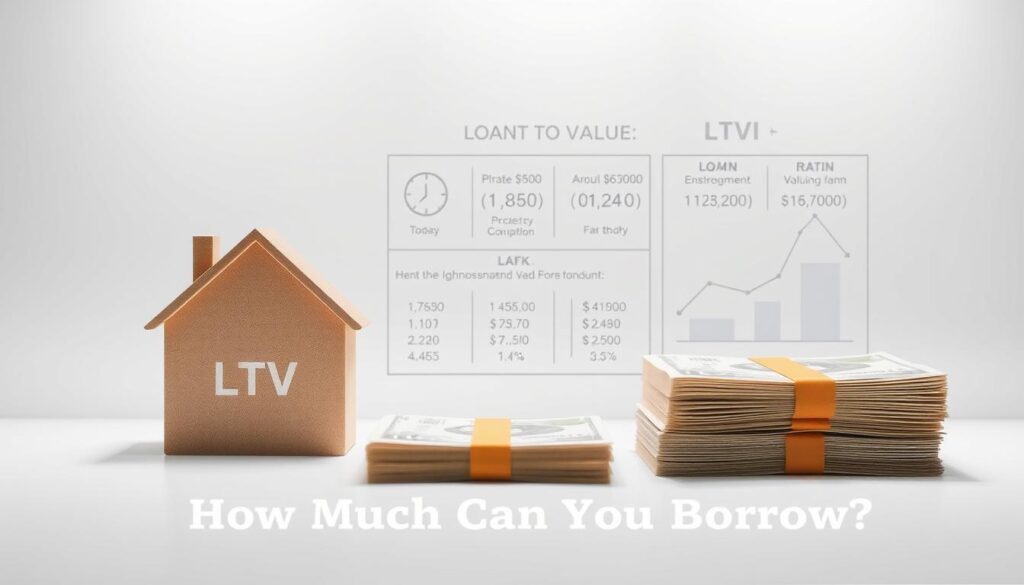Equity Loan: Leverage Your Home’s Value
Did you know that over 70 million homeowners in the United States have built significant equity in their homes? This equity can be a powerful financial tool. It allows homeowners to tap into their home’s value to achieve their financial goals.
We will explore how a home equity loan works. It provides a lump-sum payment that you can repay at a fixed interest rate over an agreed period.
By leveraging your home’s value, you can access the funds you need to achieve your financial objectives.
Key Takeaways
- Homeowners can tap into their home’s equity to achieve financial goals.
- A home equity loan provides a lump-sum payment with a fixed interest rate.
- The loan is repaid over an agreed period.
- Homeowners can leverage their home’s value to access funds.
- A home equity loan can be a powerful financial tool.
What is an Equity Loan?
An equity loan lets homeowners use their home’s value to get money. It’s a loan that uses your home’s equity as security. This way, you can borrow money for different needs.
Definition of an Equity Loan
An equity loan, also known as a home equity loan or second mortgage, lets homeowners borrow a sum of money. This money comes from the equity in their home. The definition of an equity loan is about using your home’s value to get funds.
“Using home equity as collateral can give you a better interest rate than other loans,” it’s tied to your property’s value.
How Equity Loans Work
Equity loans let homeowners borrow against their equity line of credit. First, your home’s current value is checked. Then, the mortgage balance is subtracted. Finally, the loan amount is decided based on this.
- The lender checks your home’s value and your credit.
- A loan amount is set based on your home’s equity.
- You get the loan amount as a lump sum or a line of credit.
Knowing how equity loans work is key to making smart financial choices.
Why Consider an Equity Loan?
Equity loans are a great option for homeowners. They let you use your home’s value to get cash. This can help with many financial needs.
Advantages of Equity Loans
One big benefit of an equity loan is getting a lot of money at a low interest rate. This is because your home secures the loan, making it safer for lenders.
These loans are also very flexible. You can use the money for anything, like fixing up your home or paying off debt. Experts say, “Equity loans are a flexible tool for homeowners to reach their financial goals.”
Common Uses for Equity Loans
People often get equity loans for a few main reasons. One is to finance home improvements. This can make your home more valuable and increase your investment.
Another reason is debt consolidation. It helps by combining high-interest debts into one, lower-interest loan. This can make managing your money easier and save you money on interest. Jean Chatzky, a financial advisor, said,
“Consolidating debt can be a great way to simplify your finances and reduce stress.”
Equity loans can also cover big expenses like education, major purchases, or unexpected costs. Just make sure to use the money wisely and can afford to pay it back.
Types of Equity Loans
Understanding the different equity loans is key to using your home’s value. Homeowners have several options, each for different needs and situations.
Home Equity Loans vs. HELOCs
Home equity loans and Home Equity Lines of Credit (HELOCs) are common. Home equity loans give a lump sum upfront. You borrow a fixed amount at a fixed rate.
HELOCs, on the other hand, offer a line of credit. You can draw funds as needed, up to a limit, and repay them over time.
Home equity loans have predictable payments and a fixed rate, making budgeting easier. HELOCs are flexible, great for ongoing expenses or projects.
Fixed-rate vs. Variable-rate Equity Loans
Fixed-rate and variable-rate loans differ. Fixed-rate loans have a fixed rate for the loan term, offering stable payments. Variable-rate loans have rates that change with the market.
Here’s a comparison of these loan types:
| Loan Type | Interest Rate | Repayment Terms | Flexibility |
|---|---|---|---|
| Home Equity Loan | Fixed | Fixed term | Limited |
| HELOC | Variable | Variable draw period, then fixed repayment | High |
| Fixed-rate Equity Loan | Fixed | Fixed term | Limited |
| Variable-rate Equity Loan | Variable | Variable term | Moderate |
Knowing the differences helps choose the right loan. Whether you want predictability or flexibility, there’s a loan for you.
How to Qualify for an Equity Loan
To use your home’s equity, you must meet certain standards. Lenders check your financial health to see if they should lend to you.
Credit Score Requirements
Your credit score is very important for getting an equity loan. Lenders usually want a score of 700 or higher. A high score shows you’ve handled money well in the past.
For more info on credit score needs, check out Bankrate’s guide on equity loan requirements.
Debt-to-Income Ratio Considerations
Lenders also look at your debt-to-income (DTI) ratio. This ratio shows how much of your income goes to debt. They like a DTI of 36% or less, but some might go up to 43%.
A lower DTI means you have a good balance between debt and income. This makes you more likely to get approved.
| Qualification Factor | Preferred Value |
|---|---|
| Credit Score | 700+ |
| Debt-to-Income Ratio | ≤36% |
By knowing and improving these key areas, you can boost your chances for an equity loan. This way, you can fully use your home’s value.
Understanding Interest Rates
To make smart choices about your equity loan, knowing about interest rates is key. Rates can change based on your credit score and how much of your home’s value you’re borrowing. Understanding these can help you find the best rate.
Factors Affecting Interest Rates
Several things can change the interest rate you get for an equity loan. Your credit score is very important because lenders see high scores as safer. The loan-to-value ratio also matters, showing how much of your home’s value you’re borrowing. Other factors include the loan term, the type of loan, and the lender’s rules.
Comparing Interest Rates Among Lenders
To get the best deal, comparing interest rates from different lenders is crucial. Look at rates from banks, credit unions, and online lenders. An equity loan calculator can show how different rates affect your payments and the loan’s total cost.
When comparing, don’t just look at the interest rate. Also, check for other costs like origination fees and closing costs. Some lenders might have lower rates but higher fees, so look at the total cost.
By knowing what affects interest rates and comparing rates, you can choose wisely for your equity loan. Tools like an equity loan calculator can also help manage your loan well.
Equity Loan Application Process
Understanding the equity loan application process is key. It involves several important steps. These steps help lenders check if you’re a good candidate and value your home.
Steps to Apply for an Equity Loan
Here’s what you need to do to apply for an equity loan:
- Pre-approval: This step gives you an idea of how much you can borrow.
- Application submission: You’ll share your financial details.
- Appraisal: An appraiser will check your home’s value.
- Processing and underwriting: The lender will review your application and do a title search.
- Closing: After approval, you’ll sign the final documents and get the loan funds.
Knowing these steps can help you prepare. It makes the application process easier.
Documentation You’ll Need
To apply for an equity loan, you’ll need some documents:
- Identification documents (driver’s license, passport)
- Income verification (pay stubs, W-2 forms)
- Financial statements (bank statements, investment accounts)
- Proof of insurance (homeowners insurance)

Having these documents ready can speed up the application. It also improves your chances of getting approved.
Potential Risks of Equity Loans
Equity loans can be helpful, but they also have big risks. Borrowers need to think carefully about these risks, including the chance of losing their home.
One big risk is losing your home if you can’t pay back the loan. Equity loans use your home as collateral. If you can’t make payments, the lender can take your property.
Risk of Foreclosure
The risk of foreclosure is a big worry for those considering equity loans. Foreclosure can hurt your credit score and financial health. It’s key to check your finances before borrowing.
- Look at your income and if you can afford the loan payments.
- Check your other debts and how they might affect your ability to repay the loan.
- Know the loan’s terms, like the interest rate and how you’ll pay it back.
For more on avoiding equity loan risks, check out Bankrate’s guide on home equity loans.
Impact on Home Equity
Equity loans also affect your home’s equity. By borrowing against your home, you reduce your equity. This is a problem if the housing market drops, leaving you owing more than your home’s value.
- Keep an eye on the housing market and its impact on your home’s value.
- Think if the loan’s benefits are worth the risks to your home equity.
- Plan how to manage your loan payments to protect your equity.
Knowing these risks and how to avoid them helps you decide if an equity loan is right for you.
How Much Can You Borrow?
Knowing how much you can borrow is key when you apply for an equity loan. It’s all about your home’s equity. The amount you can borrow depends on your home’s value and the loan-to-value ratio.
Calculating Your Home’s Equity
To figure out how much you can borrow, start by calculating your home’s equity. Equity is what you own in your home after paying off your mortgage. For example, if your home is worth $200,000 and you owe $150,000, you have $50,000 in equity.
To calculate your home’s equity:
- Find out your home’s current market value.
- Subtract the amount you still owe on your mortgage from this value.
Loan-to-Value Ratio Explained
The loan-to-value (LTV) ratio is very important. It shows how much of your home’s value you can borrow against. For example, an 80% LTV ratio means you can borrow up to 80% of your home’s value.
For example: If your home is worth $200,000 and you have $50,000 in equity, an 80% LTV ratio lets you borrow up to $160,000. But, you can’t borrow the full amount because of your existing mortgage.

Understanding the LTV ratio and calculating your home’s equity are crucial. Lenders use these to decide how much to lend and to make sure your loan is safe.
Alternatives to Equity Loans
If you’re not sure about equity loans, there are other ways to get the money you need. Homeowners can look at different options. Each has its own good points and things to think about.
Personal Loans vs. Equity Loans
Choosing between a personal loan and an equity loan is a big decision. Personal loans don’t need collateral, like your home. This is good if you don’t want to risk your property. But, they usually have higher interest rates because they’re riskier for lenders.
Equity loans let you borrow against your home’s value. They might have better interest rates. But, your home could be at risk if you can’t pay back the loan. “It’s all about knowing your finances and picking the right loan,” a financial advisor advises.
Cash-Out Refinancing
Cash-out refinancing is another choice. It means refinancing your mortgage for more than you owe and keeping the extra. This can be appealing because it lets you use your home’s equity and might lower your interest rate.
But, there are downsides to cash-out refinancing. The good is that you can roll your debt into one, lower-interest loan. The bad is that you’ll extend your mortgage term. This could mean paying more in interest over time.
It’s key to think about all your options and maybe get advice from a financial expert. This way, you can choose what’s best for your financial future.
Managing Your Equity Loan Responsibly
Managing your equity loan well is crucial to avoid problems. It’s important to know the key points of managing an equity loan.
Making Timely Payments
Making payments on time is a big part of managing your equity loan. Late payments can cause extra fees and hurt your credit score. To avoid missing payments, set up automatic payments with your bank or lender.
Benefits of Timely Payments: On-time payments prevent late fees and improve your credit history. This is good if you need to get other loans or credit later.
Avoiding Over-Borrowing
It’s also key to not borrow more than you need. It’s tempting to use the money you can borrow, but too much debt can be a financial burden.
Assess Your Needs Carefully: Before you borrow, think about what you really need. Make a budget to see how much you should borrow and for what. This helps you avoid borrowing too much.
By paying on time and not borrowing too much, you can handle your equity loan well. This will help you reach your financial goals.
Closing Thoughts on Equity Loans
Think about your financial situation and goals to see if an equity loan is for you. Equity loans can help you use your home’s value for different financial needs.
Assessing Your Financial Situation
Before deciding on an equity loan, check your finances. Look at your credit score, debt-to-income ratio, and home equity. This will show if you qualify and what risks you might face.
Final Tips for Borrowers
If you choose an equity loan, here are some tips. Make sure to pay on time to avoid losing your home. Don’t borrow more than you can handle. And, always read the loan terms carefully before signing. These steps will help you manage your loan well and reach your financial goals.









